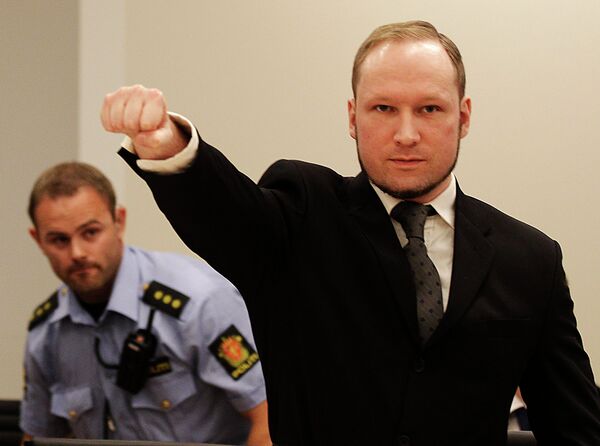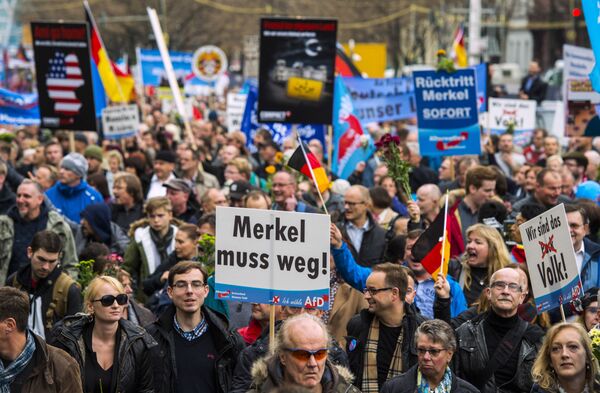Research from the UK-based think tank the Royal United Services Institute (RUSI), found that there had been a sharp rise in lone wolf terrorist attacks since 2011, with concerns about a further increase given anti-immigrant sentiment given the influx of refugees in Europe.
New study aiming to understand #LoneActor terrorists in Europe and overlooked far right terrorists https://t.co/PVDQJV219L
— RUSI (@RUSI_org) February 29, 2016
Since 2000, 33 percent of all lone wolf attackers across the EU, Norway and Switzerland were driven by far-right ideology, according to the study, the second highest motivating factor behind religious factors (38 percent).
Don't Underestimate Far-Right Extremists
Religious-based attacks (38 percent) accounted for the highest number of violent lone-wolf incidents between 2000 and 2014, however RUSI's Countering Lone-Actor Terrorism (CLAT) project noted that far-right attacks had been the most deadly in recent times, accounting for 94 out of 195 deaths between 2000 and 2014.

While Norwegian Anders Breivik accounted for 77 of these deaths during his violent terrorist attacks in 2011, researchers highlighted the disproportionate lack of attention given to right-wing extremism, calling on governments to "give greater consideration to the threat from far-right lone actors, particularly in light of the refugee crisis."
With significant attention being applied to Islamic terrorism following the rise of terror groups like Daesh (also known as ISIL), RUSI said governments and security agencies shouldn't ignore the threats posed by lone wolf or small cell attackers.
"The CLAT dataset shows that the threat stemming from far-right lone actor terrorism across Europe is significant. It also shows that right-wing lone actors were less likely to have been under active investigation by authorities than religiously inspired individuals.
"Policymakers and the police must give greater consideration to the threat from far-right lone actor terrorism, and not underestimate its capacity when compared with Islamist extremism."
The report stated that such attacks far-right attacks were "motivated predominantly by anti-immigration or Islamophobic beliefs" while concepts of "white supremacy" which featured in the attacks carried out by Breivik, were also common features of far-right violence.
Given the migration criticism, which has resulted in more than one million people — mostly Muslim — entering Europe from the Middle East and North Africa, there is a heightened risk of attack from the "resurgent" far-right extremist movement, researchers said.
Increase in Far-Right Support
While the report only took into account statistics until the end of 2014, the findings come amid a significant increase in attacks on refugees and other new arrivals in Europe.

In Germany, which has borne the brunt of the migration crisis, there were more than 220 serious attacks on refugee homes throughout 2015.
These incidents were backed up by increased support for political parties with either strong anti-immigration or anti-Islamic sentiment, such as France's Front National and Germany's AfD party and the Pegida movement.
Although many members and supporters of such groups are not engaged in far-right extremism and violence, researchers raised concerns about the flow-on impacts such movements may have.
"While these groups themselves are not violent, they may provide the 'moral oxygen' for far-right lone actors, as was seen in the case of Anders Breivik."
Media 'Under-Reporting' Far-Right Violence
The general public's lack of understanding of the threat and extent of anti-immigrant violence was a result of the media's "substantial under-reporting of far-right violence," RUSI said — with the trend particularly concerning in countries that "exhibit a strong cultural or political presence of extreme right-wing elements."
"The media devotes significant coverage to a rise in threat levels relating to the threat of Islamist attacks, but rarely for far-right attacks," the report stated.
On top of efforts to limit the rise of extreme far-right sentiment, RUSI called for security agencies to pay closer attention to the rhetoric and online behavior of members associated with far-right groups.





